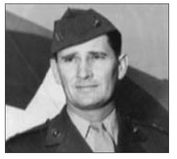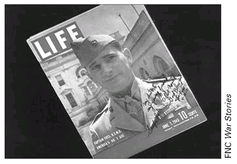War Stories II (36 page)
Authors: Oliver L. North

At 2305 on 11 October, Scott, aboard his flagship
San Francisco
and accompanied by the cruisers
Helena
,
Salt Lake City
, and
Boise
, and the destroyers
Farenholt
,
Duncan
,
Laffey
,
Buchanan
, and
McCalla
, practically bumped into the oncoming Japanese northwest of Cape Esperance. Scott's force succeeded in “capping the âT' ” of Goto's little armada and immediately sank a Japanese cruiser and a destroyer and set a second cruiser afire. Within the hour, the Americans severely damaged the third cruiser, Goto's flagship
Aoba,
as it fled north up the slot.
San Francisco
and accompanied by the cruisers
Helena
,
Salt Lake City
, and
Boise
, and the destroyers
Farenholt
,
Duncan
,
Laffey
,
Buchanan
, and
McCalla
, practically bumped into the oncoming Japanese northwest of Cape Esperance. Scott's force succeeded in “capping the âT' ” of Goto's little armada and immediately sank a Japanese cruiser and a destroyer and set a second cruiser afire. Within the hour, the Americans severely damaged the third cruiser, Goto's flagship
Aoba,
as it fled north up the slot.
The Americans weren't completely unscathed. The USS
Duncan,
hit by both Japanese and American gunfire, sank shortly after the melee. The destroyer
Farenholt
and the cruiser
Boise
, damaged by Japanese shells, had to be taken out of action for repairs. But the attack had been turned away. Ashore, Kawaguchi cancelled his ground assault and the Marines around
Henderson Field enjoyed their first night in over a month without Japanese naval gunfire or ground attacks. On the morning of 13 October their spirits were further buoyed by the arrival of a convoy from New Caledonia delivering new aircraft, food, ammunitionâand, best of all, 3,200 fresh troops from the U.S. Army's Americal Division.
Duncan,
hit by both Japanese and American gunfire, sank shortly after the melee. The destroyer
Farenholt
and the cruiser
Boise
, damaged by Japanese shells, had to be taken out of action for repairs. But the attack had been turned away. Ashore, Kawaguchi cancelled his ground assault and the Marines around
Henderson Field enjoyed their first night in over a month without Japanese naval gunfire or ground attacks. On the morning of 13 October their spirits were further buoyed by the arrival of a convoy from New Caledonia delivering new aircraft, food, ammunitionâand, best of all, 3,200 fresh troops from the U.S. Army's Americal Division.
Unfortunately, the respite was all too brief. That night, the new arrivals were subjected to a brutal, ninety-minute barrage from two Japanese battleships that wrecked the “Cactus Air Force” aircraft, destroyed a bomb dump, some fresh food stores, a fuel dump, and blasted holes in the Henderson Field and Fighter One runways and aprons. The damage was so severe that heavy air raids by land-based bombers from Rabaul were practically unopposed the next day. Encouraged, Goto returned with two new cruisers and did more damage.
By 15 October, there were fewer than a dozen flyable U.S. aircraft left on Guadalcanal. When Australian coast watchers reported that six Japanese transports were sneaking down the slot to deliver 4,500 troops to Kawaguchi that night, there were too few planes to mount a raid. By the morning of 16 October, when fifteen replacement Wildcats and Dauntlesses were flown in, the Seabees and Marines had patched the airfields but the Americans on Guadalcanal were once again outnumbered, scarce on ammunition, and living on half rations.

With so few fleet assets available, Nimitz knew that the only way to hold Guadalcanal was to keep the fighters, bombers, and torpedo planes based at Henderson Field and the nearby Fighter One auxiliary strip flying. That required the infantry to protect the airfieldsâand the constant delivery of planes, parts, bombs, ammunition, fuel, and pilots.
One of those pilots was a South Dakota farm boy named Joe Foss. He had become part of the “Cactus Air Force” on 9 October. At the ripe age of twenty-seven, Foss was one of the oldest pilots flying in the Pacific. Just four days after his arrival, he led sixteen Wildcats from Henderson Field to intercept thirty-two Japanese planes.

CAPTAIN JOE FOSS, USMC
Henderson Field
Guadalcanal, Solomon Islands
16 October 1942
1400 Hours Local
Henderson Field
Guadalcanal, Solomon Islands
16 October 1942
1400 Hours Local

We would try to get off early. The coast watchers up the line told us how many airplanes were headed our way. And they'd give the numbers of the dive-bombers and Zeros. We had a pretty good idea about the time that they'd hit Guadalcanal.
I went up with a flight of eight Wildcats and there were two flights of eight up thereâsixteen airplanes. We'd start climbing up to get altitude. I was always aiming for 25,000 feet.
Zeros were always sneaking around there. You never knew whether they came off a carrier or where they came from. They just swarmed down on us. They could gain altitude in a hurry and come back because the one thing they had was speed. Where we got our speed was to nose over at full throttleâyou picked up speed with our heavier airplanes. The Wildcat weighed 8,900 pounds and the Zero weighed 5,900.
In this case, I was right in the middle of a lot of Zeros and there were Zeros off to the right. Four airplanes were off to my left.
I thought that I'd go for number one, because, old hunter that I am, in shooting down a goose or duck, if you get the leader, it sort of confuses the flock. In this case I got number one but somebody had “sprinkled” me with machine gun fire before I got there and evidently my radio went out. Well, I got this guy and swung wide, figuring that I'd get another one. But, these guys cut across and started giving me a good blast. So when I dived, that's when
pow!
The son-of-a-gun hit the oil cooler, and it doesn't take long for that engine to seize. When it did, the engine was running full throttle so that sudden stop caused by the seized engine twisted off the reduction gear and that caused a tremendous scream and vibration.
pow!
The son-of-a-gun hit the oil cooler, and it doesn't take long for that engine to seize. When it did, the engine was running full throttle so that sudden stop caused by the seized engine twisted off the reduction gear and that caused a tremendous scream and vibration.
When I leveled out I went to make a right turn around the field, then I came around to land toward the sea on Fighter One. And the Zeros were blasting me as I'm slowing down. I drop the gear the last minute just before I hit the ground. I just punched the handle to release the ratchet and then the whole thing goes
plowing!
plowing!
The flaps didn't work and the speed is above 140 knots. I was trying to preserve the airplane and applied as much brake as I could without going “end over appetite.”
I was just sailing on that coral runway and the end of it was coming up. I went up between the palm trees in the only row where there were no trucks or anything stored and stopped. I thought, “Well, the score's tied right now. I got one, they got one.”
Â
Joe Foss on LIFE magazine.

They fixed my plane and most of the others. In the four times I got shot down, three times I landed on the field. So I always liked to stay right out there between the Henderson Field and Cape Esperance and fight.
I personally shot down twenty-six planes and I had some smokers, too. Our squadron probably had as many smokers as confirmed kills. I just was happy to knock one off so he won't be back to bother you tomorrow. After all, you're fighting for your life. The idea was to get rid of them. I fight for keeps.

Joe Foss's “Flying Circus” holds the record of 208 aerial victoriesâa feat that is unlikely to ever be broken. He personally achieved twenty-six kills and tied Eddie Rickenbacker's World War I record. Foss was awarded the Congressional Medal of Honor for his achievements at Guadalcanal.
 1ST MARINE DIVISION FORWARD PERIMETER
1ST MARINE DIVISION FORWARD PERIMETERBLOODY RIDGE, GUADALCANAL
26 OCTOBER 1942
2230 HOURS LOCAL
26 OCTOBER 1942
2230 HOURS LOCAL
On 18 October, Nimitz flew to Noumea to see Admiral Ghormley and learned that his deputyâthough responsible for the Guadalcanal campaignâhad never gotten within 1,000 miles of the battle. Dissatisfied with Ghormley's explanations for not doing more to curtail the Tokyo Express or providing sufficient support for Vandegrift, Nimitz replaced his friend with a man who had a reputation for “going into harm's way”âVice Admiral William “Bull” Halsey.
“The Bull,” as the Marines and sailors called him behind his back, flew immediately to Henderson Field to meet with General Vandegrift. The Marine commander was blunt, telling Halsey that his Marines could hold Henderson Field, but that the Navy wasn't doing enough to support them.
Stung by those straightforward words, Halsey promised Vandegrift that from now on he would get what he needed from the Navy. Before leaving Henderson Field, he decorated more than fifty of Vandegrift's Marines.
But the Bull didn't stop at handing out medals. When he returned to Noumea, the code-breakers at Station Hypo informed him that Yamamoto was planning a major Combined Fleet operation to support another Imperial Army assault on the Guadalcanal airfields. Halsey directed the battleship
Washington
and its escorts to step up patrols north of Guadalcanal to interdict the Tokyo Express. He also ordered Vice Admiral Thomas Kinkaid to take the
Hornet
and the hastily repaired
Enterprise
and head northeast of Guadalcanal to intercept a Japanese carrier-battleship fleet headed south from Truk.
Washington
and its escorts to step up patrols north of Guadalcanal to interdict the Tokyo Express. He also ordered Vice Admiral Thomas Kinkaid to take the
Hornet
and the hastily repaired
Enterprise
and head northeast of Guadalcanal to intercept a Japanese carrier-battleship fleet headed south from Truk.
Other books
Alan Rickman by Maureen Paton
Behind the Mask by Elizabeth D. Michaels
Agent with a History by Guy Stanton III
Runaway by Winterfelt, Helen
The Great Bazaar and Brayan’s Gold by Brett, Peter V.
Island Rush by Marien Dore
Madame Tussaud's Apprentice by Kathleen Benner Duble
The Crowfield Curse by Pat Walsh
I Haiku You by Betsy E. Snyder
